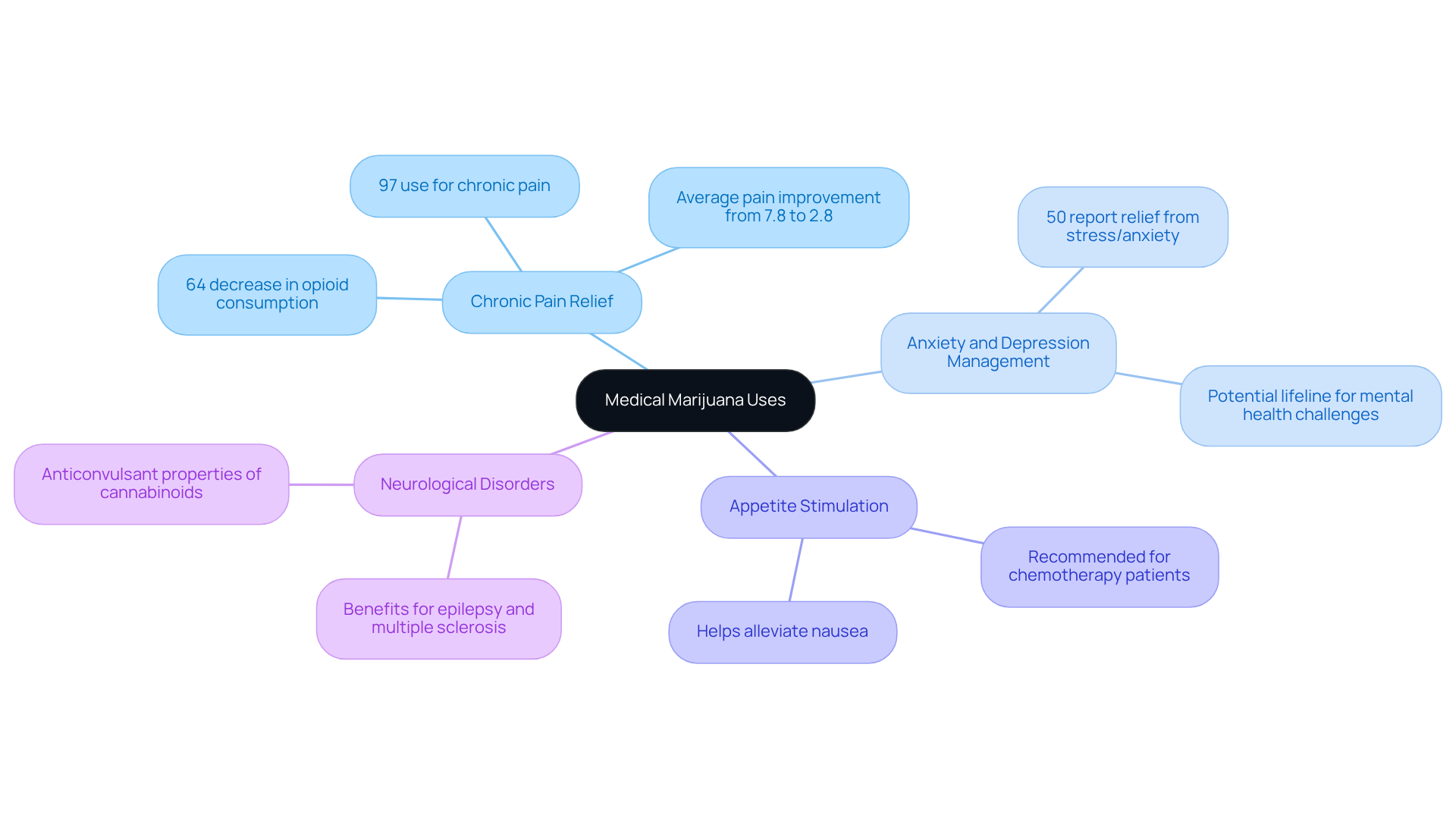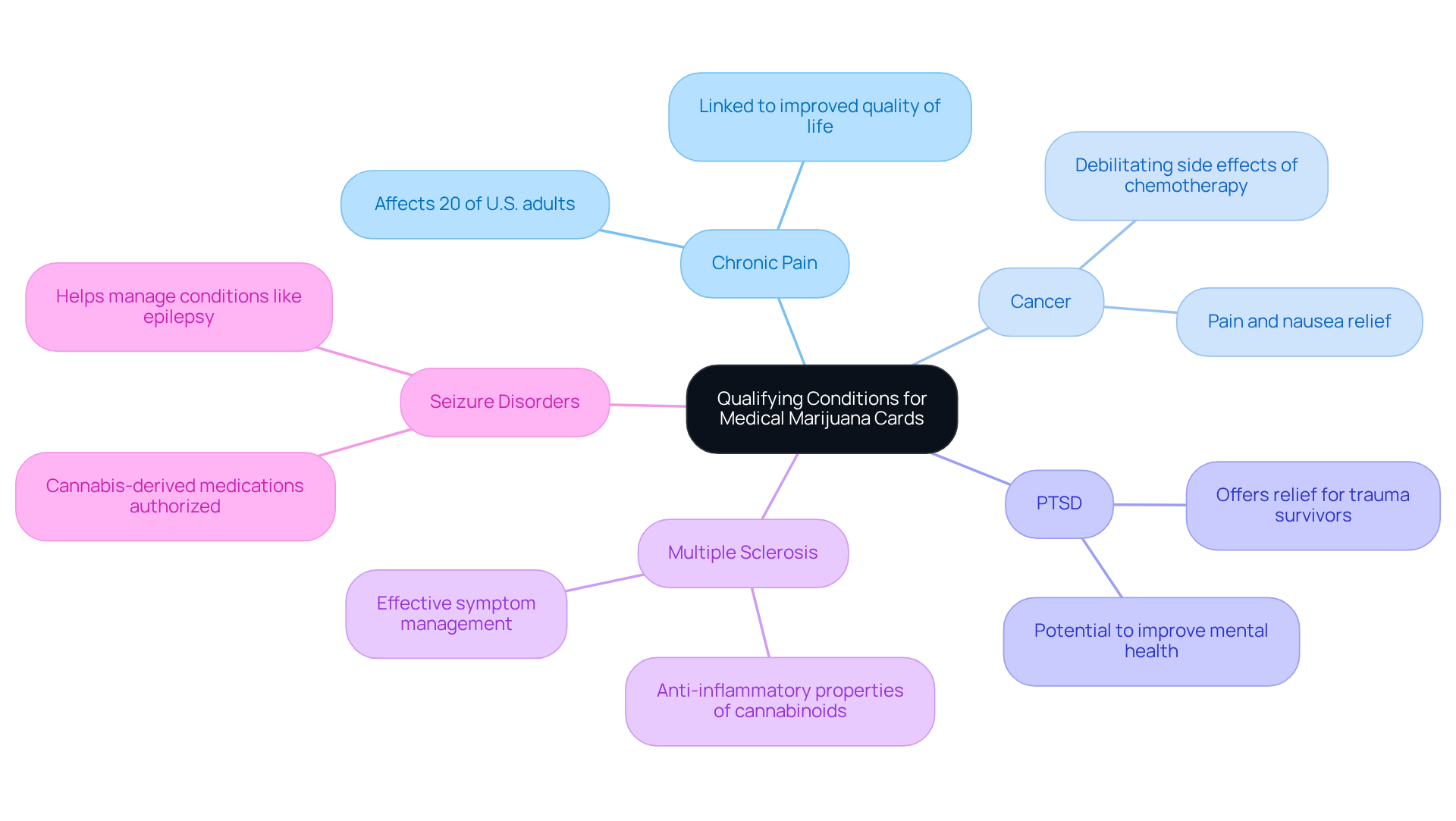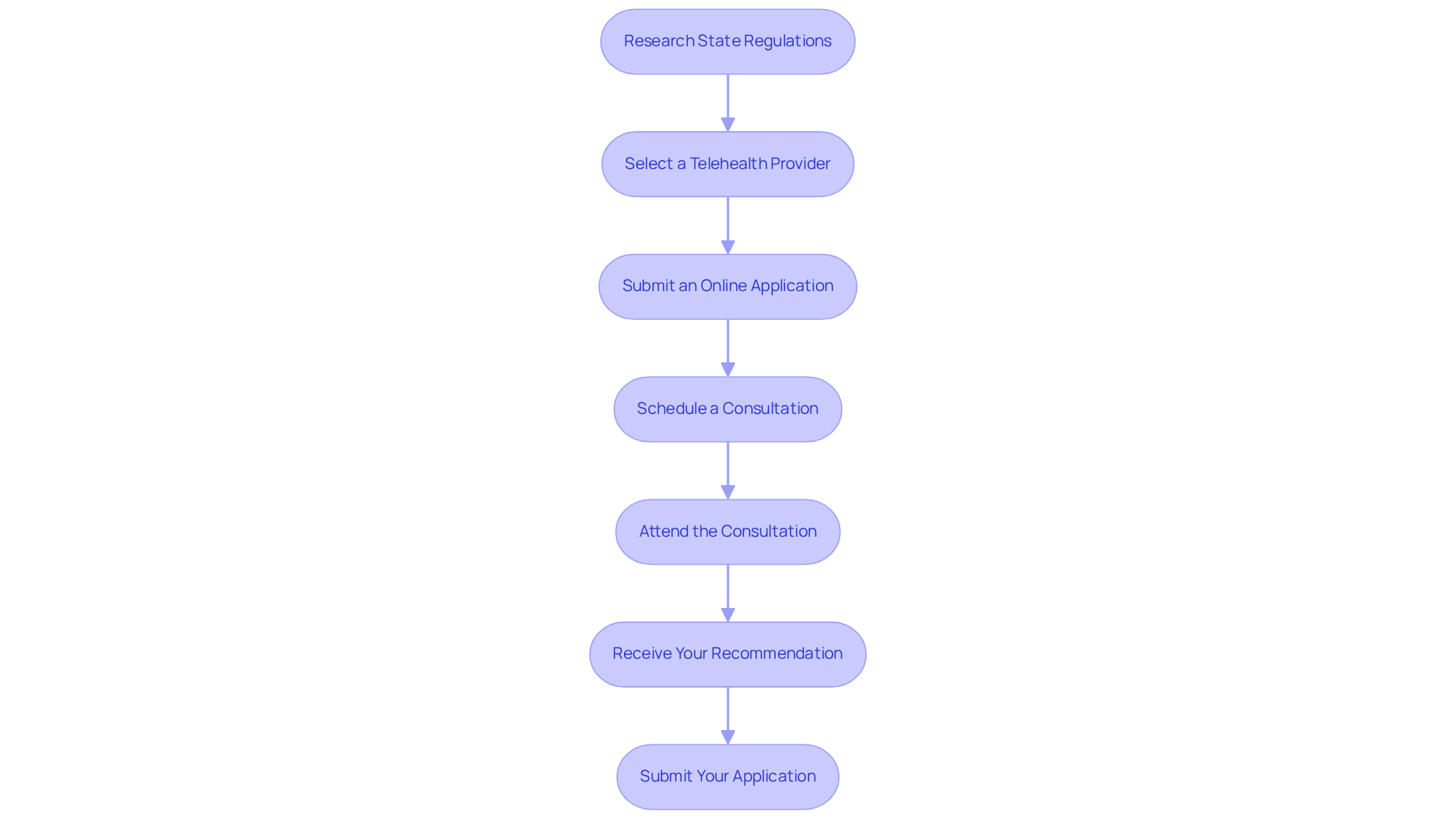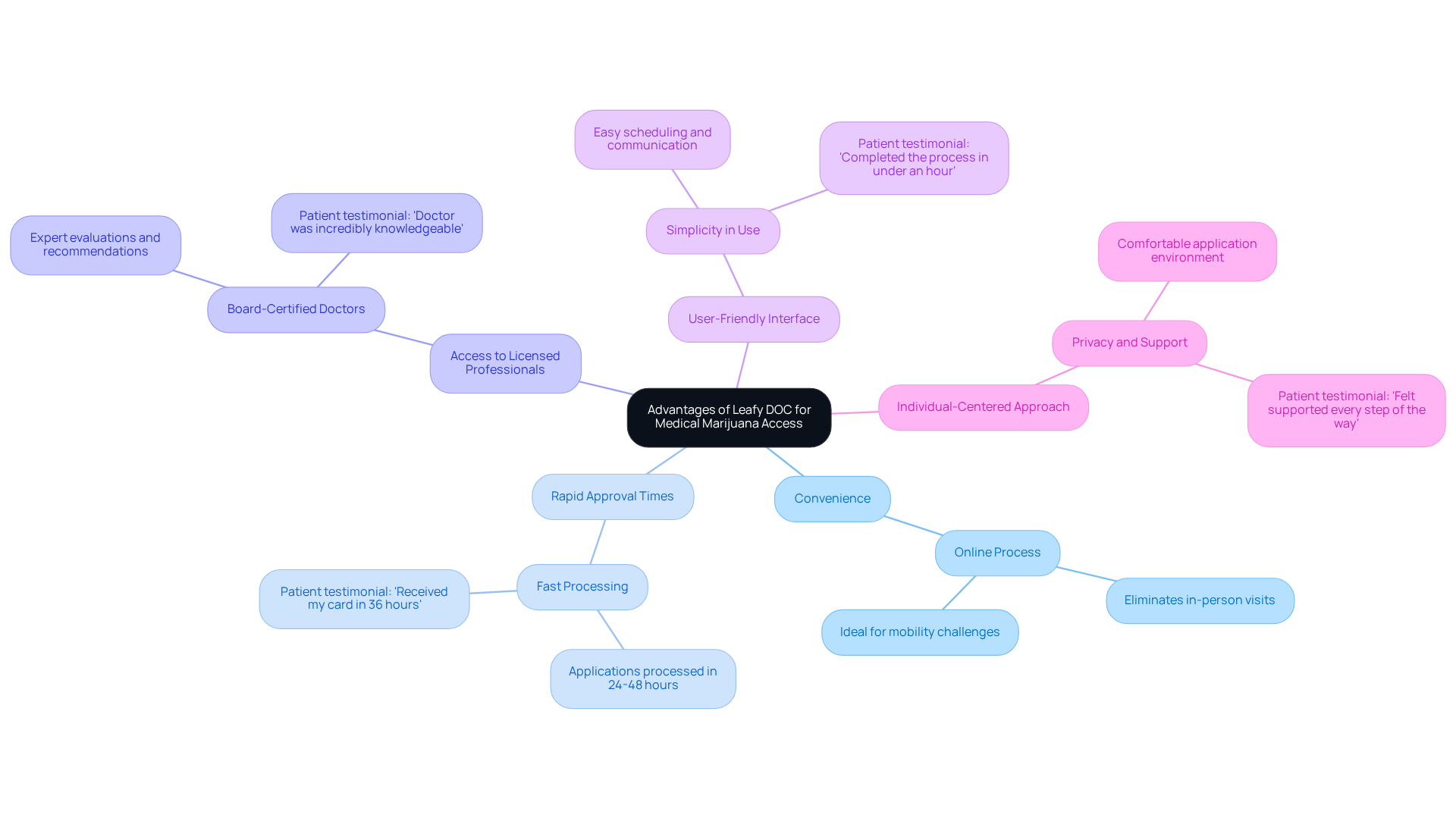Navigating medical marijuana.gov: Steps to Obtain Your Card
by Maya Green · July 27, 2025
Learn how to navigate medical marijuana.gov to obtain your card for therapeutic use.

Overview
Navigating the journey to obtain a medical marijuana card can feel overwhelming, but you are not alone. This article provides a compassionate overview of the steps involved through medicalmarijuana.gov, detailing the qualifying conditions, the application process, and the numerous advantages of utilizing telehealth services like Leafy DOC.
It’s important to remember that understanding state regulations is key. By taking the time to familiarize yourself with the requirements, you can empower yourself to navigate the process effectively. Online consultations offer a convenient option, allowing you to connect with healthcare professionals from the comfort of your home. You may find that these telehealth platforms not only streamline the application process but also provide rapid approval times, making access to medical marijuana more attainable for those in need.
As you consider this path, know that help is available, and the process can be manageable. Embrace the opportunity to explore your options, and take the first step towards enhancing your well-being. Your health matters, and with the right resources, you can find the support you need.
Introduction
Navigating the complexities of medical marijuana can feel overwhelming, especially for those seeking relief from chronic pain, anxiety, or other debilitating conditions. It’s important to remember that with the rise of telehealth services, individuals now have unprecedented access to the resources they need to obtain their medical marijuana cards through platforms like medicalmarijuana.gov.
You may find yourself wondering: what are the essential steps in this process, and how can you ensure you meet the necessary qualifications? Understanding these dynamics not only empowers you as a patient but also opens the door to a potentially life-changing treatment option.
Define Medical Marijuana and Its Uses
Therapeutic substances derived from the hemp plant or its extracts offer hope for addressing various health issues. These substances contain active compounds known as cannabinoids, which interact with the body’s endocannabinoid system to create therapeutic effects. It’s important to recognize how medical marijuana.gov can serve as a compassionate option for those in need. Here are some common uses:
- Chronic Pain Relief: Many individuals turn to medical cannabis to alleviate persistent pain, especially those grappling with conditions like arthritis or fibromyalgia. Research indicates that incorporating therapeutic marijuana, as highlighted on medical marijuana.gov, can lead to a remarkable 64% decrease in opioid consumption among chronic pain sufferers. In fact, a survey revealed that 97% of participants primarily used the substance for chronic pain relief.
- Anxiety and Depression Management: Certain strains of the plant have been shown to help reduce anxiety and elevate mood, presenting a potential lifeline for individuals facing mental health challenges. Surveys suggest that around 50% of users report relief from stress and anxiety after using products from medical marijuana.gov, part of a broader survey with a 94% response rate, underscoring its therapeutic potential.
- Appetite Stimulation: For those undergoing treatments like chemotherapy, medical marijuana.gov is often recommended to help stimulate appetite and alleviate nausea, making a significant difference in their quality of life.
- Neurological Disorders: Conditions such as epilepsy and multiple sclerosis may also benefit from the anticonvulsant properties of cannabinoids, offering hope for those affected.
Understanding these applications is crucial for individuals seeking to make informed choices about their treatment options. It’s essential to discuss these alternatives with healthcare professionals who can provide guidance tailored to individual needs. Encouragingly, 71% of individuals reported no negative effects from cannabis consumption, although it’s worth noting a slight increased risk of depression among frequent users. By including insights from healthcare professionals, we can further substantiate these claims and enhance the conversation around this important topic. Remember, you are not alone in your journey, and exploring these options can lead to a more fulfilling path toward wellness.
Identify Qualifying Conditions for Medical Marijuana Cards
Acquiring a cannabis card through medical marijuana.gov can be a vital step for individuals facing health challenges. To qualify, one must have a condition recognized by their state’s cannabis program. Common qualifying conditions include:
- Chronic Pain: Persistent pain lasting longer than six months affects about 20% of U.S. adults, translating to over 50 million individuals. Many people suffering from long-term discomfort seek cannabis as a beneficial treatment alternative. Research has linked its use to decreased healthcare visits and improved quality of life.
- Cancer: Those undergoing cancer treatment often qualify due to the debilitating side effects of chemotherapy, which can include severe pain and nausea.
- PTSD: Post-traumatic stress disorder can be alleviated with cannabis, offering relief to those who have experienced trauma.
- Multiple Sclerosis: This neurological condition may benefit from the anti-inflammatory properties of cannabinoids, effectively managing symptoms.
- Seizure Disorders: Conditions like epilepsy may allow individuals to use therapeutic cannabis, as specific cannabis-derived medications have been authorized to help manage seizures.
It’s important to remember that each state has its own list of qualifying conditions, which can be found on medical marijuana.gov. Therefore, checking the criteria on medical marijuana.gov is essential to ensure you meet the local regulations. For instance, in Louisiana, chronic pain is one of the most common reasons individuals seek therapeutic cannabis treatment, requiring documented health history and a consultation with a licensed doctor. Understanding these guidelines is crucial for anyone looking to navigate the complexities of acquiring a cannabis card. You may find that taking these steps can lead to a more manageable and fulfilling life.
Explain the Process of Obtaining a Medical Marijuana Card Through Telehealth
Acquiring a cannabis marijuana card via telehealth is not just a procedure; it’s a pathway to improved accessibility for patients seeking relief, as outlined on medical marijuana.gov. Here’s how this compassionate process unfolds:
- Research State Regulations: It’s essential to familiarize yourself with your state’s specific requirements and qualifying conditions, as they can vary significantly. Understanding these details can empower you on your journey.
- Select a Telehealth Provider: Choose a trustworthy telehealth service like Leafy DOC, which prioritizes evaluations for therapeutic herb. Their patient-centered approach ensures you feel supported every step of the way.
- Submit an Online Application: Take a moment to fill out the required forms, outlining your health history and current conditions. This thorough assessment is vital for your well-being.
- Schedule a Consultation: Arrange a meeting with a licensed healthcare expert who will evaluate your eligibility for cannabis. This is a crucial step in your journey toward relief.
- Attend the Consultation: During the video or phone call, openly discuss your health history and symptoms with the doctor. They are there to guide you through this process with understanding and care.
- Receive Your Recommendation: If authorized, the physician will provide a recommendation, which you can use to apply for your marijuana card through your state’s health department. This is an important milestone in your journey.
- Submit Your Application: Finally, submit the required documents and fees to your state, ensuring all information is accurate and complete. This step brings you closer to the relief you seek.
This telehealth procedure not only saves time but also allows individuals to receive essential evaluations from the comfort of their homes. Many applications are processed within 24-48 hours, offering peace of mind. The convenience of telemedicine has transformed access to cannabis, as documented on medical marijuana.gov, making it easier for those with mobility issues or residing in remote areas to obtain the care they need. Remember, you are not alone in this journey; support is available, and each step brings you closer to feeling better.
Highlight the Advantages of Using Leafy DOC for Medical Marijuana Access
Utilizing Leafy DOC for medical marijuana access offers numerous advantages that truly cater to the needs of patients, making the journey a little easier.
-
Convenience: Imagine being able to complete the entire process online, eliminating the need for in-person visits. This is especially beneficial for those facing mobility challenges or living in rural areas. It’s a small step that can make a significant difference in your experience.
-
Rapid Approval Times: Many applications are processed within 24-48 hours, allowing individuals to quickly obtain their cannabis cards and access essential treatments without delay. For instance, one individual shared their relief at receiving their card in just 36 hours after submitting their application.
-
Access to Licensed Professionals: Leafy DOC connects you with board-certified doctors who specialize in medical cannabis. This ensures that you receive expert evaluations and recommendations tailored to your specific conditions. One patient remarked, “The doctor I spoke with was incredibly knowledgeable and made me feel at ease throughout the consultation.”
-
User-Friendly Interface: The platform is designed with simplicity in mind, enabling you to easily schedule appointments, submit intake forms, and communicate with healthcare providers. One user noted, “I completed the entire process in under an hour, which was a huge relief!”
-
Individual-Centered Approach: Leafy DOC prioritizes your privacy and support, creating a comfortable environment throughout the application process. Another individual expressed gratitude, stating, “I felt supported every step of the way, and my privacy was always respected.”
These features collectively position Leafy DOC as a dependable option for individuals navigating the complexities of obtaining a medical marijuana.gov card. The numerous patient testimonials praising the efficiency and accessibility of the service serve as a testament to its effectiveness. If you’re considering this path, know that support from medical marijuana.gov is only a click away.
Conclusion
The journey to obtaining a medical marijuana card can significantly enhance the quality of life for individuals facing various health challenges. By understanding the therapeutic uses of medical marijuana, identifying qualifying conditions, and navigating the application process through convenient telehealth services, patients can access the relief they need in a compassionate and efficient manner.
This article has explored the multifaceted benefits of medical marijuana, including its efficacy in managing chronic pain, alleviating anxiety and depression, stimulating appetite, and aiding those with neurological disorders. It has also detailed the step-by-step process of securing a cannabis card, emphasizing the importance of consulting with licensed healthcare professionals to ensure eligibility based on state-specific regulations. Furthermore, the advantages of using platforms like Leafy DOC were highlighted, showcasing their role in simplifying access to medical marijuana through rapid approvals and user-friendly interfaces.
Ultimately, embracing the possibilities offered by medical marijuana can be a transformative experience for many. It’s important to stay informed and proactive in discussing treatment options with healthcare providers, ensuring that you can make empowered choices on your path to wellness. As the landscape of medical marijuana continues to evolve, resources like medical marijuana.gov and services like Leafy DOC stand ready to support you in seeking a better quality of life through compassionate care.
Frequently Asked Questions
What is medical marijuana?
Medical marijuana refers to therapeutic substances derived from the hemp plant or its extracts, containing active compounds known as cannabinoids that interact with the body’s endocannabinoid system to create therapeutic effects.
What are some common uses of medical marijuana?
Common uses of medical marijuana include chronic pain relief, anxiety and depression management, appetite stimulation for chemotherapy patients, and treatment of neurological disorders such as epilepsy and multiple sclerosis.
How effective is medical marijuana for chronic pain relief?
Research indicates that incorporating therapeutic marijuana can lead to a 64% decrease in opioid consumption among chronic pain sufferers, with 97% of survey participants primarily using it for pain relief.
Can medical marijuana help with anxiety and depression?
Yes, certain strains of medical marijuana have been shown to help reduce anxiety and elevate mood, with around 50% of users reporting relief from stress and anxiety.
How does medical marijuana stimulate appetite?
Medical marijuana is often recommended for individuals undergoing treatments like chemotherapy to help stimulate appetite and alleviate nausea, significantly improving their quality of life.
Are there any risks associated with using medical marijuana?
While 71% of individuals reported no negative effects from cannabis consumption, there is a slight increased risk of depression among frequent users.
Should individuals consult healthcare professionals before using medical marijuana?
Yes, it is essential to discuss treatment options with healthcare professionals who can provide tailored guidance based on individual needs.
Last Updated: July 26, 2025
Get Approved for Your Medical Marijuana Card in Minutes!

Get Your Medical Card
Connect with a licensed physician online in minutes

Like This Article?
Share with your friends
Table of Contents
Keep Reading
-
Understanding The Endocannabinoid System: A Comprehensive Guide
Discover the fascinating world of the endocannabinoid system and its impact on your health. Uncover the secrets with our comprehensive guide and unlock optimal wellness today! Click here to understand the endocannabinoid system explained.
-
Medical Marijuana for PTSD in Veterans and First Responders
Learn about the use of medical marijuana in treating PTSD in veterans and first responders. Discover how cannabis can be used to manage symptoms and improve quality of life.
-
How to Get Your Online Medical Marijuana Card in Florida
Get your online medical marijuanas card in Florida with this step-by-step guide.







